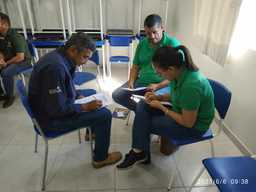Mato Grosso State, Brazil

Table of Contents
PAGE in Mato Grosso, Brazil
The Brazilian state of Mato Grosso, which has benefitted economically from the growth of its large agricultural sector, is now working towards increasing the added value of its agricultural commodities while reducing the environmental and social challenges associated with this growth, such as poor working conditions and uneven income distribution. To tackle these challenges, Mato Grosso is promoting new economic activities, technologies, and efforts to rehabilitate its natural resource base. Brazil joined PAGE in 2016 and is now a Graduating Country.

Sustainable Development
These activities contribute to the achievement of SDGs 2 (Zero Hunger), 4 (Quality Education), 7 (Affordable and Clean Energy), 8 (Decent Work and Economic Growth), 9 (Industry, Innovation and Infrastructure), 11 (Sustainable Cities and Communities), 12 (Responsible Consumption and Production) and 17 (Partnership for the Goals).

PAGE Milestones
- 2023
PAGE Mato Grosso is running a Green Recovery training.
- 2022
Mato Grosso’s State Secretariat of Planning developed a framework and strategy for planning, implementing, and measuring achievements under the 2030 Agenda – with PAGE support.
PAGE produced a study on how to support micro and small producers and family businesses related to innovation, machinery, logistics, energy use, and investments in cleaner, more efficient technology.
PAGE Mato Grosso-Brazil has launched its a website in Portuguese and a series of print and audiovisual campaign materials to promote the results of the initiative in the country and raise public awareness.
- 2021
Four training workshops for public servants on sustainable tourism guidelines
Coaching for twelve companies on sustainable tourism guidelines
Standards for smart and sustainable construction and building renovation completed
- 2020
Two workshops on the State Government Integrated Family Farming System held
Four workshops held in the Municipality of Salto do Céu to guide preparation and implementation of the Participatory Master Plan for Municipal Development
Salto do Céu Participatory Master Plan for Municipal Development adopted
Assessment of Green Economy Learning Needs for Mato Grosso Training Institutions completed
Sustainable Management Plan for the Historic Center of Cuiabá developed
Diagnostic of Socio-economic, Productive and Environmental Factors of the Vale do Mangaval Rural Settlement in Cáceres-MT completed
Opportunities for Employment and Income Generation based on projections of an input/output table of the economic profile of Mato Grosso completed
Training workshop for the private sector on sustainable tourism guidelines
- 2019
Operational guidelines on electronic tools for monitoring family agriculture completed
Renewable Energy Development Strategic Plan finalised
Guidelines for the standardisation and certification of Sustainable Tourism Products finalised
Cultural heritage and urban analysis of the Historic Centre of the city of Cuiabá completed
Methodology and Guidelines for the Implementation of the Participative Municipal Development Master Plans finalised
- 2018
Logical framework finalised in collaboration with government, academia and private sector
Participatory Municipal Development Master Plans developed
- 2017
Green economy stocktaking study conducted
- 2016
PAGE support to Mato Grosso starts in the context of the State’s PCI Strategy
State Steering Committee established (reconfigured in 2019 following restructuring of state government)
Mato Grosso State, Brazil News & Events
Other Platforms
Learn about the objectives and results achieved
In 2016, Mato Grosso embarked on the transition to the inclusive green economy (IGE) in line with the “Produce, Conserve, Include Strategy”, promoted by the State Government in partnership with civil society and international cooperation.
Since then, it has been implementing a series of sustainable initiatives within the framework of the Partnership for Action on Green Economy (PAGE).
PAGE Mato Grosso-Brazil has launched its a website in Portuguese and a series of print and audiovisual campaign materials to promote the results of the initiative in the country and raise public awareness.
Knowledge Hub
 pdf
pdfModelling and comparing employment impacts of COVID-19 crisis and recovery policies in Brazil
2022![Preview of Mato Grosso 2020 Annual Report]()
Mato Grosso 2020 Annual Report
2020 pdf
pdfMato Grosso Evaluation of Potentials of Generation and Use of Renewable Energies
2019 pdf
pdfMato Grosso Factsheet
2018 pdf
pdfMato Grosso Green Economy Learning Needs Assessment (PT)
2020 pdf
pdfMato Grosso Input Output Report
2020 pdf
pdfMato Grosso Methodology and guide for implementation of participative municipal development masterplans (PT)
2019 pdf
pdfMato Grosso Operational guidelines for municipalities (PT)
2019 pdf
pdfMato Grosso Stocktaking Report (PT)
2017Implementation of PAGE program
 pdf
pdfMato Grosso Strategic Plan for the Development of Renewable Energy
2019 pdf
pdfMato Grosso Sustainable Tourism Publication
2019

















